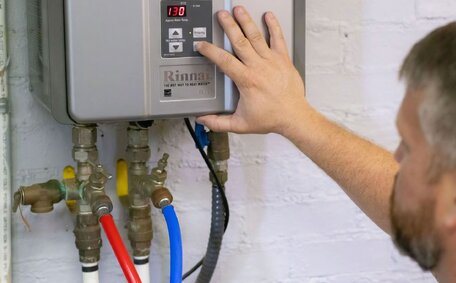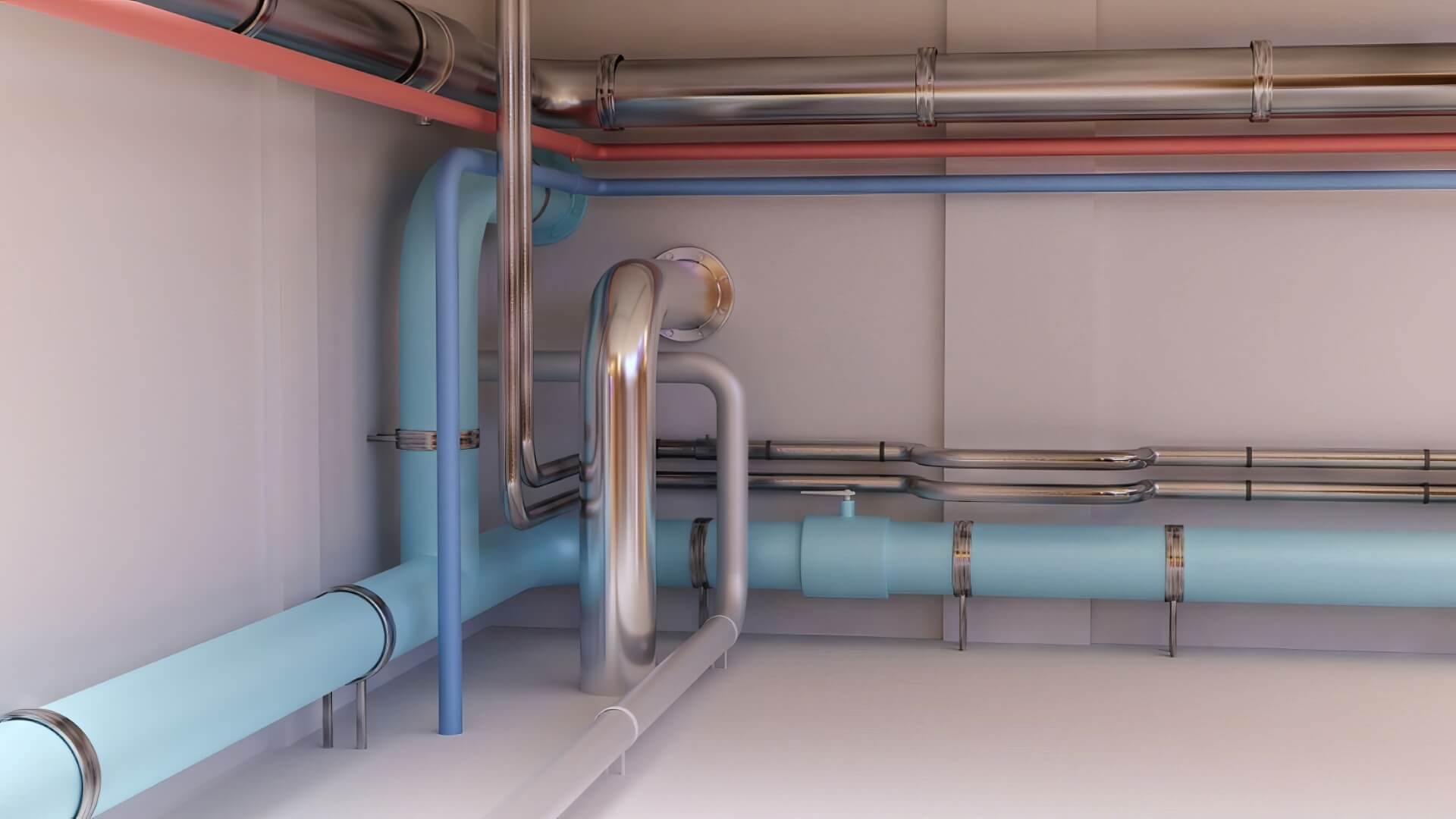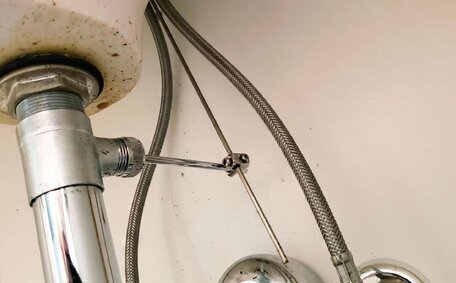The Dangers of Gas Leaks
A pilot light that’s gone out indicates a potential gas leak, which is extremely hazardous in a residential setting. Inhaling natural gas can lead to health issues, including dizziness, nausea, and in severe cases, asphyxiation. Natural gas is highly flammable; leaks can lead to fires or explosions, posing significant risks to your home and family.
Signs of a gas leak include the odour of rotten eggs, hissing sounds near appliances or pipes, areas of dead vegetation, and blowing dust around gas lines.
If you suspect a gas leak, evacuate immediately and contact a licenced gas fitter or emergency services. For safety, do not operate any electrical devices as a spark could ignite leaking gas.
DIY repairs for gas leaks are dangerous and should be avoided. Licensed gas technicians have the required expertise to find and repair gas leaks, ensuring the safety of your home. Our team can assess appliances like your gas water heater for issues, while certified gas fitter specialists have training for the repair, installation, and maintenance of gas plumbing infrastructure.
When a gas leak is identified, the gas plumber will engage in gas leak detection to determine the location and cause of the issue with your appliance. Gas line leaks can occur due to corrosion, loose fitting line connections, broken lines, or appliance issues. Our professionals will shut off the gas supply and conduct repairs to ensure the integrity of your gas pipelines and appliances.
Advanced equipment identifies the origins of leaks in gas piping with superior accuracy over conventional methods.
Considering the serious risks of gas exposure and fire, it’s crucial to address any leaks promptly; our team stands ready to assist. If you suspect a gas leak, contact our team immediately for swift intervention and to ensure your safety. Call your local experts; our team has the proper tools and expertise to remedy leaks and prevent tragic accidents or emergencies.
Signs of a Gas Leak
Being vigilant and acting swiftly when you detect signs of a gas leak is crucial for early detection and ensuring safety. There are several key indicators to learn about gas safety and watch out for when protecting against a gas leak your home or business:
- A "rotten egg" smell. Natural gas has an added odorant that produces this distinct scent to alert people to where gas may be leaking.
- Hissing, whistling, or roaring sounds emitting from a gas appliance can indicate issues with your gas pipes.
- Flames coming from locations other than the gas burner, such as around appliances.
- Unusual patches of dead vegetation or discoloured soil near gas lines outside.
- Blowing dirt, bubbling water or a hissing noise near gas lines outside.
- The distinct smell of gas inside your home or building.
- A gas bill significantly higher than usual can be an indicator of a system leak or appliance issues.
- Excess moisture collecting on windows and walls can be a sign of any gas burning anomalously.
If you detect any of these warning signs indicating a gas leak your home business, take immediate action and go outside to a safe location. Call emergency services once you are safely away from the leak site. Evacuate the building, leaving doors open as you exit to ventilate the area.
Do not turn any lights or electronics on or off, as a spark could ignite the gas – instead, quickly give us call for immediate assistance.
Natural gas leaks can be highly hazardous and require urgent attention. Being able to recognise the signs of a leak will help prevent tragic accidents—have a licensed gas professional inspect regularly. Contact us today for skilled plumber gas leak inspections and to conduct necessary repairs as soon as possible.
What to Do if You Suspect a Gas Leak
If you notice any signs of potential leaks in your gas hot water system, immediate action is required for safety:
- Evacuate the building right away and decide what you should do when safe—ensure to leave doors and windows open as you exit to ventilate.
- Avoid turning any electrical devices or appliances on or off since a spark could ignite gas.
- Move a safe distance away from the site and call 000 for emergency assistance.
- Contact your gas provider or emergency gas services from outside the building and alert them to the situation.
- Do not re-enter the premises until emergency responders indicate it is safe to do so.
- Once given the all-clear, your first phone call should be towards getting your gas back safely with a certified gas technician conducting thorough leak detection and repairs.
- Schedule annual inspections of your gas appliances and lines to stay on top of maintenance issues before they become leaks.
A gas leak can be detrimental and should never be dismissed, a leak never taken lightly. At the first hint, like when you smell gas your property’s safety may be compromised, take quick action by exiting the area, notifying professionals, and having your system inspected. This can prevent severe illness, fires, or explosions.
Shut Off the Gas
In case of a suspected gas leak, your first action should be to turn off the main gas valve, cutting the gas supply to your property.
Find your gas meter outside and turn the valve clockwise or so it’s perpendicular to the pipe to cut off the gas. This action ceases gas supply to the entire property.
It’s important to familiarise yourself with the location of your gas main valve and make sure it is easily accessible, so you can quickly turn off gas in an emergency. Label the valve clearly for easy identification.
Should you smell gas indoors, don’t touch electrical switches to prevent ignition. Evacuate immediately without using light switches and then close the main valve outdoors.
Turning off the main gas valve is an interim measure until an expert assessment and repair of the leak can be completed. Contact qualified gas technicians to detect the exact location of the leak, make repairs, and restore your gas supply once it is declared safe again for your peace.
Rapidly closing your gas supply in the event of a leak can avert mishaps, setting the stage for technicians to manage the issue securely. Ensure you and your family know where the main valve is located and how to shut off your gas line if ever required.
This action ceaseu can quickly turn off gas in an emergency.
Evacuate the Area
Immediately evacuate, ensuring your and your familyuate the Area
Immediately evacuate, ensuring your and your family’s safety, not stopping for belongings or appliances, then contact emergency services once secure.
Do not re-enter your home until professionals have given you a definite all-clear after a gas leak.
Call the Gas Company
If you smell gas or suspect a leak, the gas company should be notified immediately. Call the emergency number as soon as you think there gas leak, from outside the home and advise them of the situation. They can despatch techniions you have noticed ready to provide us today. Ensure clear access to your gas meter enabling technicians to shut off the gas supply upon arrival.
Wheo contain the threat promptly. They have specialised equipment to detect and deal gas leaks and procedures to follow in emergency situations. Let them handle the inspection and repairs for your safety.
Ventilate the Area
If you suspect a gas leak, ventilate the space immediately—it’s a crucial safety precaution. Open doors and windows to allow fresh air to circulate outside your home premises. This helps disperse any accumulated gas and reduce the risk of an explosion or fire.
Exercise extreme caution and only attempt to ventilate if it is safe to re-enter the premises. When it comes to gas emergencies, never put yourself at risk by going back inside a building filled with gas just to open windows. If you are still smelling gas outside after an indoor leak, wait for emergency services to arrive before trying to ventilate.
Running ventilation fans and turning on exhaust systems can also help clear out gas, if this can be done from outside the building. Turn fans to blow air out, not in, to avoid spreading gas indoors.
Proper ventilation makes the area safer for first responders and gas technicians to enter and find the source of the leak. Fresh air dilutes the gas, making leaks easier to detect with gas sensors. It also reduces the chance of an ignition that could lead to explosion.
Never ignore the importance of ensuring your own safety through ventilation when a dangerous gas leak is possible. Allowing fresh air to circulate could save lives and minimise property damage until professionals can stop the leak safely.
The Role of Plumbers in Fixing Gas Leaks
Plumbers must be certified for gas fitting to repair leaks; our team at Glenwood Plumbing includes fully licensed gas fitting professionals.
When a gas leak occurs, we have the training and expertise to locate and stop the leak safely. Using specialised gas detection equipment, our technicians can pinpoint the origin of the leak and make necessary repairs.
As licenced tradespeople, our plumbers follow all safety procedures and protocols when responding to gas leaks. We also coordinate with local gas authorities as needed to ensure proper containment and repair.
Home and business owners can trust our urgent gas leak services to quickly make their properties safe again. We offer emergency response 24/7 and aim to have gas supply restored once all hazardous leaks are addressed.
Should you need assistance, don’t hesitate to call us 1300-GLENWOOD at Glenwood Plumbing at any hint of a gas leak. Our qualified plumbers can plumber fix gas leaks in your system and prevent further damage.
Plumbers must be certified for gas fitting to repair leaks; our team at Glenwood Plumbing includes fully licensed gas fitting professionals.
We offer emergency response 24/7 and aim to have gas supply restored once aues to accurately detect gas leaks. Electronic gas detectors are one of the main tools used. These portable devices have sensors that can pick up oore advanced infrared cameras can also visualise gas leaks.
A straightforward method is to swab pipes with soapy water; leak points will reveal themselves through bubble formation. Pressure gauges attached to gas linesademark rotten egg odour associated with natural gas.
Accurate leak detection takes training and experience. At the first sign of an issue, a skilled plumber can utilise the proper equipment to find any leaks,etectors are one of the main tools used. These portable devices have sensors that can pick up on small amounts of methane and gas fumes in the air.
Technicians will wave the gas detectors near pipes and appliances while walking through the home, listening for any increase in beeps that indicates a leak. More advanced infrared cameras can also visualise gas leaks.
Pressure gauges attached to gas lines can also monitor drops in pressure signalling leaks.
Hearing a hissing noise near appliances is another warning sign plumbers listen for. Good old fashioned nose power is key too - sniffing for that trademark rotten egg odour associated with natural gas.
How Plumbers Repair Gas Leaks
Upon gas leak detection, our plumbers swiftly carry out the necessary repairs.
Certified plumbers possess the expertise, equipment, and experience to safely diagnose and repair gas line leaks.
When to Call a Professional
Our plumbers are equipped to tackle gas leaks, strictly adhering to safety protocols for your protection. Avoid DIY repairs as they pose an explosion risk. Contact professional plumbing services without delay. If you suspect a leak, call a plumber immediately, at any hour of the day or night.
Signs such as a sulfuric smell or hissing from pipes deerty when emergency crews give the all-clear, as the first thing to ensure your peace of mind is our readiness for a thorough follow-up inspection. Call your technicians to conduct thorough leak detection and repairs before turning gas back on. Annual inspections can ience, equipment and skills to fix gas leaks safely and competently.
Preventing Gas Leaks
Homeowners can implement several measures to mitigate the risk of dangerous gas leaks:
- Get an annual inspecti
- Have gas appliances serviced every 1-2 years to keep them operating safely.
- Watch for signs of leaks like rotten egg smells and immediately call the gas company and plumber if detected.
- Update old stres or appliances.
- Learn how to shut off your gas main valve so you can act quickly in an emergency.
Being proactive and keep your plumbing expert involved reduces the chances of leaks. Have Glenwood Plumbing provide plumbing service annually and fix any issues before they become dangerous. Staying on top of all your maintenance needs keeps your home safe.
Homeowners can implement several measures to mitigate the risk of dangerous gas leaks:
Get an annual inspection of your gas lines by a certified plumber to check for signs of wear such as corrosion, cracks, or loose connections.Keep the gas metre area clear so the main valve is accessible in an emergency.Have gas appliances serviced every 1-2 years to keep them operating safely.Watch for signs of leaks like rotten egg smells and immediately call the gas company and plumber if detected.Update old steel pipes to safer polyethylene plastic piping to reduce corrosion risks.





